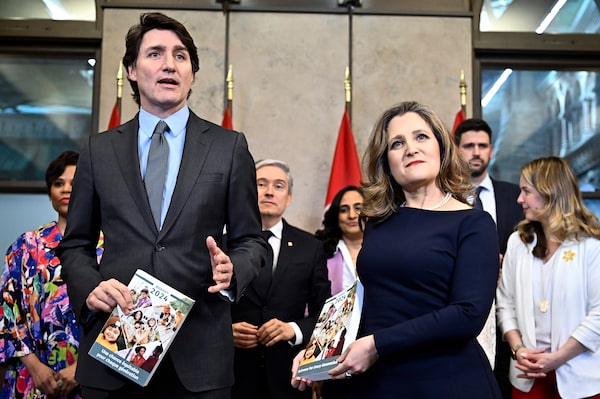
Prime Minister Justin Trudeau, Finance Minister Chrystia Freeland and cabinet ministers meet before tabling the federal budget on Parliament Hill in Ottawa, on April 16.Justin Tang/The Canadian Press
Prime Minister Justin Trudeau is in full cool-teacher mode in the latest push from the Liberals to sell their tax hike on investment income, but his lesson plan has more than a few holes.
The 3½-minute video released on social media on Monday starts off with Mr. Trudeau, sleeves rolled up and tie loosened, leaning in to tell us about the zany ideas of the ultrawealthy. “Some people don’t think the richest few should pay more in taxes. Well, I don’t agree with that,” he says with a hint of a conspiratorial smile.
The Prime Minister neglects to mention that the “richest few” already pay more in taxes – a lot more. According to the most recent data from Statistics Canada, tax filers in the top 1 per cent income group paid 22.5 per cent of federal and provincial income taxes in 2021.
Fair to say, anyone in that income bracket will still have a few dollars left over after the Canada Revenue Agency has gotten its due. But the Liberals conveniently glide past the fact that Canada’s tax system is already steeply progressive.
As well, the richest few may not be quite as few as the Liberals make out. Mr. Trudeau cites the figure in the April budget that said just 0.13 per cent of Canadians, about 40,000 people, will end up paying more taxes under the Liberals’ proposed hike to capital-gains taxation.
(The budget announced a proposed increase in the portion of capital gains subject to taxation to 67 per cent from 50 per cent, for profits above $250,000 for individuals. There is a lifetime exemption of $1.25-million available for some small businesses.)
There are a couple of problems with the Liberals’ math. The most obvious is that the annual cohort of 40,000 people is not constant. Over time, the cumulative proportion will be higher. More significantly, the increase in capital-gains taxes applies to corporations, with no $250,000 exemption. Own shares in a company (either directly, through a mutual fund or a pension plan) that reaps capital gains? Congratulations – you, too, are part of the richest few.
Amping up the class-warrior rhetoric, Mr. Trudeau then speaks to a graph showing the net worth of the richest one-fifth of Canadians rising since 2015. “At a time when the rich are only getting richer, I think it’s fair to ask those people to pay a little more,” he says.
Which would seem reasonable enough, if but for one smidgeon of a problem with his numbers: The rich have not grown richer, relative to everyone else. The proportion of wealth held by that top quintile is exactly the same as it was in late 2015, when the Liberals took office. Sure, the collective net worth of that group rose by 68 per cent in the last eight-plus years. But the net worth of the bottom three quintiles improved by more than that – the second lowest quintile saw its net worth jump by 91 per cent, for instance.
One might think that the Liberals would find reason to celebrate this success, since they seem to view wealth inequality as fundamentally unfair. Or perhaps the Prime Minister didn’t fully peruse the data set in preparing his lesson. In any case, the implication that the “rich” are making out like bandits isn’t borne out by the numbers.
Just as misleading, however, is that seemingly innocuous phrase “a little bit more.” In what world is that an accurate depiction of a $31-billion tax hike over five years, $19.4-billion of which goes to Ottawa and the remainder to the provinces and territories?
And that $31-billion “little bit more” is just the latest in a long series of Liberal not-so-small nibbles that add up to a lot. In 2016, then finance minister Bill Morneau justified the nibble of a new top tax bracket by saying, “It’s only fair to ask those who can afford it to pay a little more.” There was another nibble of “a bit more” in 2021, when the Liberals promised tax increases on corporations and the wealthy. And another nibble of “a bit more” in 2022, when Finance Minister Chrystia Freeland introduced luxury taxes.
All along the way, there’s been scant discussion about the cumulative impact of tax (and non-fiscal) policies on competitiveness, innovation and entrepreneurship. Instead, the Prime Minister offers up wedge-issue fantasies of a privileged class finally being forced to pay its fair share. What the Liberals don’t understand, or at least won’t acknowledge, is what all of their supposed nibbles add up to: too much.